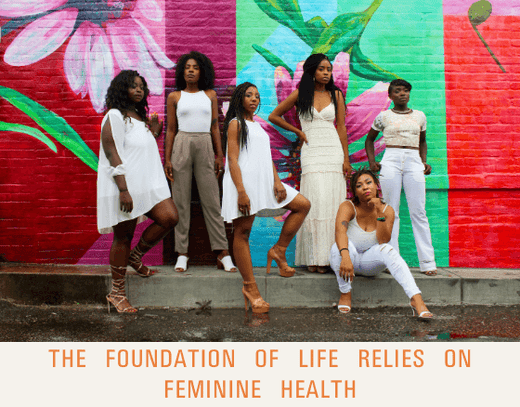We live in a world full of toxins. And sadly, many products designed for women’s health and beauty contain toxic elements that actively damage her body.
For example, women use an estimated 15,000 sanitary products (tampons, towels, pads, and panty liners) during their reproductive years. These products are laced with cancer-causing chemicals, hormone disruptors, bleach, formaldehyde, and allergens that come into direct contact with the highly absorbent vagina.
From herbicides and pesticides to personal care products and non-stick cookware, chemicals that mimic the female hormone, estrogen, are everywhere, and it takes dedication to remove them from your lifestyle and detox them from your body.
But by being selective with food, products, and cosmetics, women can avoid many of the chemicals disrupting hormones and harming the body. Eating plenty of approved organic, alkaline, and electric fruit and vegetables helps the body naturally cleanse excess hormones and nourish feminine health.
What Are Endocrine Disruptors?
Endocrine disruptors are chemical toxins found in food and the environment that throw these critical female hormones out of balance. Here are just a few examples:
- Sugar: intrinsically linked to estrogen, refined sugar is implicated in poly-cystic ovaries (PCOS)
- Soy: contains substances that mimic estrogen, preventing natural estrogen from working effectively
- Pesticides: disturb the menstrual cycle, are linked to infertility and can cause birth defects
- Plastic: bottles and food packing contain chemicals that mimic and disrupt hormones
- Parabens: in hair products and cosmetics, elevate estrogen and are linked to breast cancer
- Phtlates: in hairspray and nail polish, and are linked to birth defects and infertility
- Tampons: are often bleached, and contain hormone-disrupting chemicals and microplastics
- Triclosan: is a hormone-disrupting antibacterial found in toothpastes and hand sanitizer
Consequences of Hormonal Imbalances
Both estrogen excess (due to hormone-mimicking chemicals) and estrogen insufficiency (due to inflamed hormonal glands) impair fertility and disrupt the entire body. If the delicate balance of hormones is damaged, it creates chaos; impacting appetite, digestion, libido, mood, energy, and even the motivation to move.
Excess estrogen has also been linked to an increased risk of breast cancer, heavier periods, reduced sex drive, weight gain, and mood swings. Low levels of estrogen make your bones weak, can make sex painful, increase urinary infections, and are associated with depression.
Additionally, disruption of the hormone’s normal function often increases appetite and hinders your ability to manage a healthy weight. Hormonal imbalances reduce libido, lower your mood and disrupt sleep patterns.
It also puts you at risk for serious health conditions, including:
Fibroids
Fibroids are non-cancerous tumors that impact nearly 80% of women by age of 50. Despite the medical opinion that the cause of fibroids is still unknown, there is strong evidence that fluorinated carbons (found in non-stick pan coatings and fire retardants) drive their growth.
Endometriosis
Endometriosis is a condition where tissue similar to the lining of the womb forms outside the womb, often along the fallopian tubes. This painful condition affects 10% of women and is also linked to endocrine-disrupting chemicals.
Breast Cancer
Breast cancer is yet another condition related to hormone excess. About 70% of breast cancers are driven by estrogen imbalance. Estrogen directly interacts with growth hormones, so it’s not surprising it would drive the excess cell growth found in breast cancer, endometriosis, and fibroids.
Natural Female Hormone Health
Fortunately, there are many simple ways to rebalance haywire hormones and upgrade uterine health.
- Coconuts: Water from young soft-jelly coconuts can safely and naturally restore hormone levels, protect bone health, and enhance emotional control.
- Diet: Red meat, dairy, sugar, soy, and processed food increase the risk of fibroids and endometriosis. A plant-based, alkaline diet has been shown to reduce or eliminate these conditions entirely. Burro bananas and berries (except cranberries) are a source of minerals and flavonoids, while garbanzo beans add fiber to remove excess hormones.
- Hydration: Tap water is often contaminated with hormones from birth control pills, bleach, pesticides, and chemicals used to soften plastics. Drink pure and natural spring water to reduce toxin exposure.
- Hygiene: Don’t use chemicals or perfumed products on your sensitive areas. Dr. Sebi’s safe and natural Uterine Wash and Oil keeps you feeling fresh with a blend of hygienic herbs to reduce bacterial odor, prevent candida, and treat UTIs.
- Movement: Gentle exercise helps remove toxins and eases the pain of periods by releasing endorphins and supporting menstruation.
- Periods: Avoid toxic and environmentally polluting products, and choose washable organic unbleached cotton pads, mooncups (natural latex or rubber cups worn inside the vagina), or sea sponges to safely collect blood.
- Pregnancy: Many hormonal issues resolve after having a baby. Hormone levels are so high during this time that they “outcompete” the artificial ones plaguing the body.
- Rest: Getting more sleep, and reducing your stress levels, will help to regulate hormone levels. Natural light patterns also stimulate hormones that keep your cycle regular.
Hormone Supplements: Made from hydrangea, damiana, sarsaparilla, Irish sea moss, blue vervain, and other incredible herbs, Dr. Sebi’s Estro reduces menopause symptoms, eases the pain of periods, and improves emotional balance.



















































2 comments
I bought the products I want to know how much to take I have several
I love the Estro product it really helps me with menopause and I haven’t had a period in 7 months. I also haven’t been moody or irritable since I’ve been taking Estro & sleeping better.